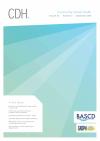Community Dental Health

- Cover Date:
- September 2018
- Print ISSN:
- 0265 539X
- Electronic ISSN:
- 2515-1746
- Vol:
- 35
- Issue:
- 3
Confirmatory factor analysis of the health literacy in dentistry scale (HeLD) in the Australian population
Objective: To determine the psychometric properties of both the long- and short-form versions of the Health Literacy in Dentistry (HeLD) instrument in a large sample of the Australian adult population. Methods: Data were from a subset of the National Dental Telephone Interview Survey 2013. Both the long (HeLD-29) and short-form (HeLD-14) were utilised, each of which comprises items from 7 conceptual domains: access, understanding, support, utilization, economic barriers, receptivity and communication. Confirmatory Factor Analysis was performed through structural equation modelling to determine factorial validity, where the χ2/df, comparative fit, goodness of fit and root mean square error of approximation were used as indices of goodness of fit. Convergent validity was estimated from the average variance extracted (AVE) and composite reliability (CR), while internal consistency was estimated by Cronbach standardized alpha. Results: The dataset comprised 2,936 Australian adults aged 18+ years. The kurtosis and skewness values indicated an approximation to a normal distribution. Adequate fit was demonstrated for HeLD-14, but not for HeLD-29. Estimates of ≥ 0.50 for AVE and ≥ 0.70 for CR were demonstrated across all factors for both HeLD-29 and HeLD-14, indicating acceptable convergent validity for both forms. Discriminant validity was also demonstrated for both forms. Internal consistency was adequate in the seven conceptual domains for both HeLD forms, with Cronbach’s alpha for all subscales being ≥0.70. Conclusions: The psychometric properties of the HeLD instrument in a large sample of the Australian adult population were confirmed. The short form HeLD-14 was more parsimonious than the long-form (HeLD-29).
Key words: oral health literacy, construct validity, discriminative validity, reliability
© BASCD 2018
doi:10.1922/CDH_4325Ju08
- Article Price
- £15.00
- Institution Article Price
- £
- Page Start
- 140
- Page End
- 147
- Authors
- X Ju, DS Brennan, E Parker, S Chrisopoulos, L Jamieson
Articles from this issue
- Title
- Pg. Start
- Pg. End
- Dental Public Health In Action: Barriers to oral healthcare provision for older people in residential and nursing care homes: A mixed method evaluation and strategy development in County Durham, North East England
- 136
- 139
- Confirmatory factor analysis of the health literacy in dentistry scale (HeLD) in the Australian population
- 140
- 147
- Patients’ willingness to pay for dental services in a population with limited restorative services
- 167
- 172
- Oral health behaviours and oral health-related dietary behaviours: The interrelationship and determinants by latent class analysis
- 173
- 178
- Depressive symptoms and untreated coronal dental caries among adults ages 21-64 years, NHANES 2013-2014
- 179
- 185
